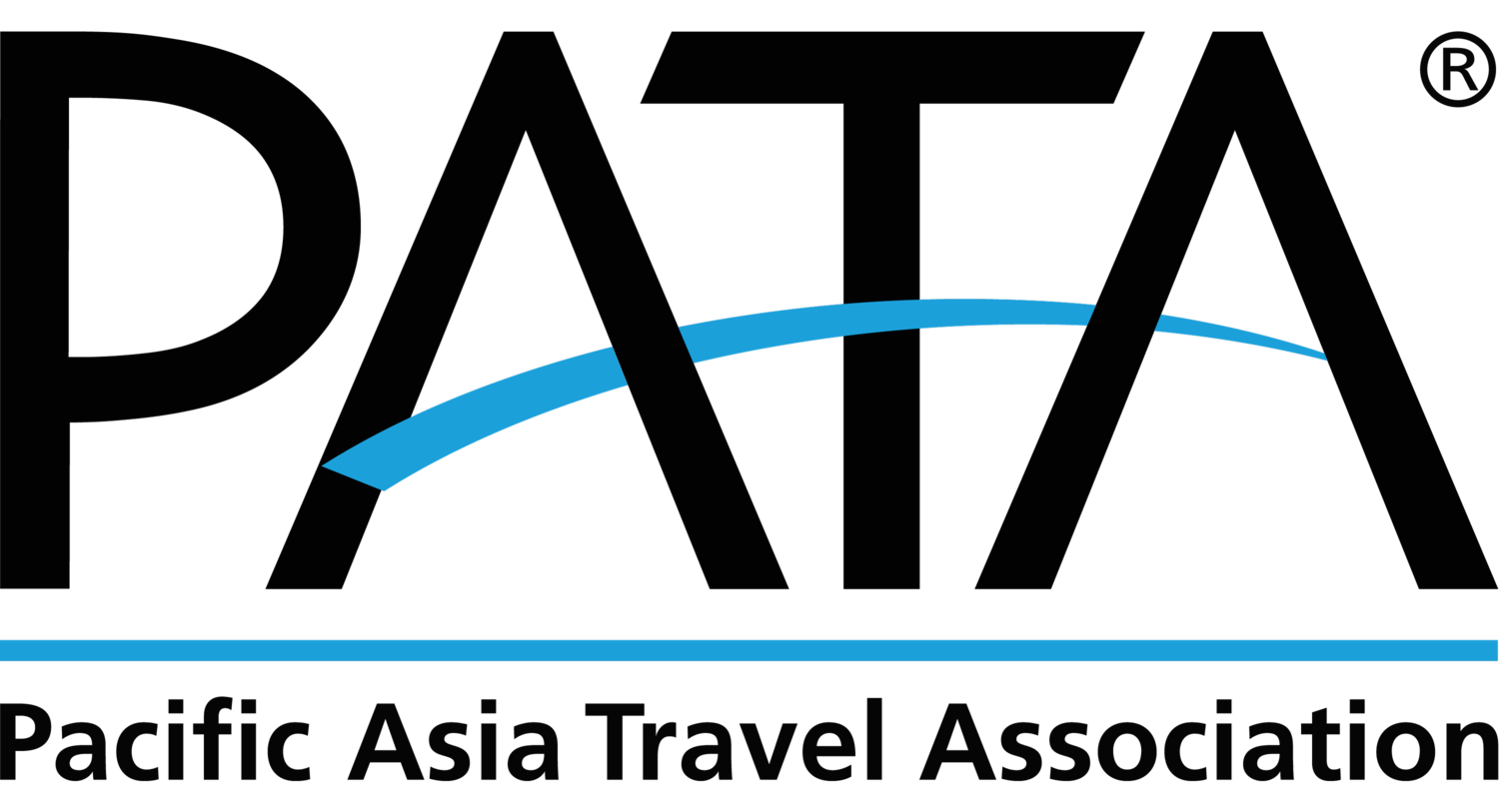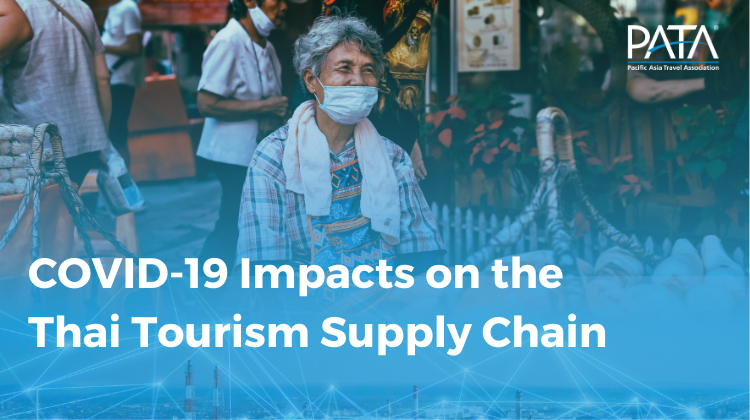COVID-19 Impacts on the Thai Tourism Supply Chain
By Phimphika Artthakhan, Napason Wetchapram, Fernanda Rodak & Yolinka Vossen
This article presents research carried out between December 2020 and March 2021 by the Pacific Asia Travel Association (PATA) and focusright, a Swiss consultancy that works with companies to embed responsible business practices throughout their supply chains. Supported by the Federal Department of Foreign Affairs Switzerland, the project examined the impacts of the COVID-19 pandemic on informal workers in the Thai tourism value chain. The research identified urgent and necessary actions needed to support workers in the Thai informal supply chain until international tourism restarts.
For more projects on the Thai Tourism Supply Chain and the Informal Workers: https://www.pata.org/blog/pata-reaching-out-to-tourisms-forgotten-people-the-informal-workers (updated Nov 18, 2021)
“I normally meet a street food seller with a smile on her face. But now she looks sad,
and I cannot see the happiness from that face anymore. COVID-19 has put her in a tough situation.”
- Ving, Tour Guide, Bangkok
The impacts of COVID-19 on tourism worldwide have been extensively deliberated over the past year. The question is not if tourism will survive, but what will it look like post-COVID-19. There remain many unanswered questions with most pundits focused on airlines, hospitality, travel agencies, and tour operators. These deliberations, therefore, miss the crucial element of tourism everywhere - the informal tourism workers.
Informal workers include street food sellers, souvenir sellers, drivers, freelance tour guides, activity providers, artists and artisans to name just a few. They provide local experiences that create memorable tourism. Yet, such professions are repeatedly ignored when discussing the tourism value chain, even though they make up a majority of tourism employment and provide entrepreneurial opportunities to women, youth and elderly. This vital sector lacks voice and is often excluded from industry discussions.
After all, what would Thai tourism be without tuk-tuks, traditional massage, and the amazing street food? The country received 39.8 million international visitors in 2019 and saw this number drop to 6.7 million last year [1]. So, without tourists, what happened to the informal workers? What have they been doing? And how are they coping with this situation? And most importantly, what will it look like post-COVID-19 with many businesses and individuals affected?
The research sought feedback from informal tourism workers in Thailand, with a total of 72 interviews conducted by COVID-19 impacted tour guides in December 2020. These guides were selected due to their extensive on-the-ground knowledge of the three leading destinations in Thailand – Bangkok, Phuket and Chiang Mai. Tour guides are the bridge between visitors and the informal sector. The interviews provided an understanding of the current living conditions of the 72 interviewees. They were asked about their work and financial situation, survival strategies, what kind of support they require, and their hopes for the near future.
Unsurprisingly, the results revealed that 94% of informal workers interviewed have experienced employment impacts due to the lack of international visitors. As a result, 86% have experienced financial hardship leading to negative effects on mental health and quality of life. Many interviewees reported feeling depressed from a lack of prospects for the future [2].
To survive, many informal workers have turned to friends and family for financial support. Others have sold personal belongings, taken on loans or sought work outside of travel and tourism to provide for their families. Many were adamant that the government’s domestic tourism stimulus campaigns and support were neither enough nor did they reach all the workers in need, especially the ones in the informal sector. Overall, the research findings confirmed how many informal workers rely on international visitors to make a living.
“I am facing financial issues and have debt at the moment.
Covid-19 brought my family difficulties and I got depressed. I had to change
jobs to be a fisherman to earn more money to support my family.
There is not enough promotion or campaign from the government to get domestic tourists.
I hope that the country will be reopened soon and available for the vaccine.”
- Long-tail boat driver, interviewed by Tum, Tour guide, Phuket
As mentioned, the support from family members and the community was, and still is, of great importance to the informal workers. This was particularly vital for migrant workers from neighbouring countries such as Cambodia, Myanmar and Lao PDR, who are not eligible to receive social benefits from the Thai Government. Many migrant workers either went back to their home countries empty-handed or relied on their community and social groups in Thailand, who are struggling themselves.
“Informal workers have spent all their savings; many shared their support
money with migrant workers who didn't have access to the Government's campaign benefits.”
- Empower Foundation, Chiang Mai
“Many nightlife workers switched to lower-earning jobs or returned to their
home province. Migrant workers also returned to their home-countries
prematurely without substantial earnings.”
- Friends-International, NGO, Bangkok
To reopen international tourism safely and sustainably, the informal workers highlighted the need for training and capacity building related to 1) health and hygiene standards and operating safety procedures, 2) community-based tourism product re-development and marketing, and 3) understanding the new needs and wants of tourists post COVID-19 to be able to offer attractive experiences to them.
On the other hand, the informal workers stressed that having easier access to official loans will not benefit them, as they do not want to incur greater debt.
The research confirms the importance of international visitors for informal workers to have a successful quality of life, and why 89% want the country to be reopened and are ready to restart their business activities and welcome back international tourists.
Though the research also brought to light that most interviewees experienced difficulties, there were some who managed to adapt and find new jobs in other sectors that are more stable and profitable.
“A tattoo maker got a reduction for shop rental fee. Still, he temporarily closed
the shop and went back to his hometown. At the moment, he uses his
artistic skill to create handmade gifts and sell them at a market. He also took a
course on online marketing and sales.”
- JJ, Tour guide, Chiang Mai
“This local tour guide has adjusted to the crisis and changed it to a brighter
opportunity for him to try new things. He is now a Youtuber, sharing information
about tourist attractions in Phuket and providing helpful information about
the COVID-19 situation. He also will be ready for the incoming international tourists.”
- Kat, Tour guide, Phuket
Many informal workers in popular Thai tourist destinations returned to their hometowns during the pandemic, both to support family and find alternative work. However, this survival strategy, while effective, poses a challenge for tourism after COVID-19, as the destinations suffer from an immense brain drain. Workers are either happier with the new work they have found, or simply left tourism and are not planning to return.
“One interviewee used to work in a hotel but got laid off. He now owns a Thai food
stall that is a more stable job than the hotel. Now he would not go back to the tourism business.”
- Jib, Tour guide, Bangkok
“We're not sure if we'll have enough tour guides to return to work after reopening
because most of them found new jobs and are working on something else.”
- Discova, DMC
In order to better understand the types of help needed for the informal tourism supply chain, this research also consulted the private sector and civil society. When asked how they could provide support for the informal workers, three destination management companies (DMCs) reported that it would be incredibly difficult at the moment, given that they are also struggling. The DMCs are working on greatly reduced staff, hours, salaries and budget. Therefore, although they would be willing to help, for example through knowledge transfer or other forms of in-kind support, this could only be possible with funding.
“How can we get help and funding for
informal workers if even the formal sector is lacking support?”
- EXO Travel, DMC
“We are happy to help informal workers by providing information
on product diversification, marketing, product development and others - if we
have financial support.”
- Khiri Travel, DMC
As for civil society, four NGOs reported adapting to new ways of providing necessary support to vulnerable communities during COVID-19. For example, one of the organisations – that works with food security – formerly collected food from big hotel chains and distributed it to local communities in need. After the first lockdown, as the hotels were no longer able to provide this surplus food, the organisation took the opportunity to be creative and developed a community cooking experience for the hotels' guests – an idea that can be maintained even after tourism is back to normal. Nevertheless, the NGOs also stressed the need for more financial aid for informal workers as they have limited access to social security benefits.
One NGO interviewed promoted a universal social security system for both formal and informal employees. This was especially important for the tourism industry as workers often switch back and forth from formal and informal work with the subsequent loss of benefits. Consequently, government campaigns and support do not reach all the workers in need equally: while some employees may get support from more than one programme, others get no support at all.
“There is great potential for collaboration
with tourism. For NGOs to create successful partnerships with tourism
companies requires agreement, training and protocols of operations and activities.”
- Scholars of Sustenance Foundation, Bangkok
To complete the research and confirm its findings, an industry roundtable was held on March 23, 2021, and involved all relevant stakeholders including tour guides, destination management companies (DMCs), non-governmental organisations (NGOs), European tour operators, The Embassy of Switzerland in Thailand, and Thai community development organisations.
During the discussion, the DMCs emphasised the need to retain key workers from both the formal and informal tourism supply chain, such as guides and drivers. One such strategy shared by the DMCs was to support furloughed workers to create micro-businesses that provide employment and give back to host communities. Such micro-businesses also have the potential to create new tourism products as local suppliers. Such a circular supply chain creates resiliency through less dependency.
Finally, all roundtable participants raised concerns on ensuring the safety of both tourism workers and travellers once international tourism restarts. All agreed a safe and successful reopening of international tourism requires support for furloughed formal and informal workers from now (April 2021) until next year. This is based on the assumption that meaningful international tourism in Thailand will only start to return around Q2 of 2022 (or even later). Additionally, it is assumed that the Thai vaccination programme will not be finished until next year. These assumptions reinforce the crucial need to support the tourism supply chain through programmes that include training on health standards, product development, business planning, marketing, new travel trends, and new tourist behaviour. For such programmes to be successful, it is essential they support the retention of key workers and raise capacity for the safe reopening of tourism.
Given the research findings, it can be concluded that Thai tourism can only rebound strongly through a combination of actions and strategies, which includes multisector engagement, a programme for the retention of workers, the organisation of various types of training workshops, the financial support for DMCs and NGOs. Most importantly, any actions must include the informal tourism sector. They can no longer be overlooked.
Interested parties can learn more about this research project and outcomes, and be part of the discussion, by registering for the webinar, titled “COVID-19 Impacts on The Thai Tourism Supply Chain”, taking place on May 6, 2021 03:00 PM Bangkok. Click here to register in advance for this webinar.
[1] “Asia Pacific Destination Forecasts 2021-2023: Thailand” Pacific Asia Travel Association, Bangkok 2021
[2] Respondent percentages calculated from all responses for 10, 9 or 8 value.





